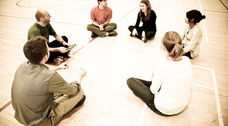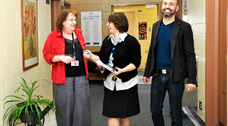2012-07-16

Half of the young people in the Douglas Institute’s Intensive Intervention Program (IIP) suffer from eating disorders, while others present various problems such as severe anxiety, affective disorders or severe psychotic disorders. They range in age from 12 to 17 years and come to the Day Hospital and Inpatient Unit when front line resources no longer suffice.
Nine years ago, with renovation plans in hand, Jean-François Bélair, MD, took a sledgehammer to the walls of the Stearns Pavilion. At the time, the psychiatrist and medical chief of the program had just started in his position. His ten years of experience at the Royal Victoria with adolescent clients in need of hospital care had convinced Dr. Bélair of the importance of environment in their recovery. "What message are we sending to young people and their families if the unit is poorly maintained and has faded walls and cramped rooms? We're saying they aren't worth the trouble!" exclaimed Dr. Bélair.
Today, the Stearns Pavilion is a carefully maintained and calming place. The space sends a clear message: all people at the unit, both patients and employees alike, deserve respect. For Jean-François Bélair, another goal of the renovations was to support interdisciplinary practices, which form the very foundation of the IIP. "Interdisciplinary work is a collective approach. Everyone offers expertise to assist the other team members with their work. For example, unusual behaviour in a youth reported in a meeting could lead to adjustments in his or her medication or a referral to our psychologist. We constantly exchange ideas and communicate with each other, as we do in our meetings with youths, their families and their external case managers," explained Dr. Bélair.
The medical chief is proud of his team. Read on to discover some of his colleagues – a human relations agent, a nurse, a nutritionist and an educator – who share his passion for working with adolescents. Marie-Josée Ouellet, PhD, psychologist, was called to attend to a patient at the time of the interview.
The picture would not be complete without testimonials from the IIP’s clinical administrative chief and the housekeeping attendant at the Stearns Pavilion. Two pillars who, according to Dr. Bélair, “are essential to keeping the unit running smoothly.”
Danielle Gauthier, Human Relations Agent

"No two days are ever the same. You always have to adapt to something new, and this challenge is stimulating," said Danielle Gauthier. Danielle has been a Human Relations Agent for 30 years at the Douglas and for 20 years in the IIP. In a way, she is like the unit's ambassador, as she is the one who manages admissions and greets families.
"Here, we aim for excellence," she pointed out. "We are always comparing our care protocols with those applied in other countries so we can give the youths in our program the best care possible."
Every week, Danielle meets the families of hospitalized youth. "Parents often feel powerless when they come here," she said, "I give them information, I advise them and, most importantly, I give them hope." Curious and passionate, Danielle has a penchant for innovation. "I like giving families ideas for fun activities to help them rediscover the pleasure of being together," she explained. For example, she invites parents and their children to make arts and crafts with finger paints and glue, or organizes a special meal for them. "My goal is to create a bridge between the hospital and home. I want to make sure these young people can apply their new skills after they leave. Every weekend, the adolescents have specific tasks to perform at home. "This week, they all completed their challenges," she exclaimed, " I’m so proud!"
Montrose "Monty" Hinkson, educator
Swimming, cooking, gardening—these are just a few of the activities in which adolescents can take part at the Intensive Intervention Unit. They aren't mandatory, but they are part of the therapeutic approach, and the majority of youth in the unit participate.

Monty Hinkson has been an educator at the Stearns Pavilion for 25 years. He comes up with activities for youth to help break the routine of their stay. "We try to interest them in new activities," he explained. The goal is not performance but rather relaxation and fun. Some youths really like animal therapy, as they find the contact with animals soothing. According to Monty, authenticity is the most important quality when working with adolescents. "We need to be honest and above all make them feel that we are present and ready to listen," he insisted.
Monty uses these activities to make their stay more pleasant: "I try to give them opportunities to develop new interests and acquire tools that help them gain even greater autonomy over their own well-being."
Mélanie Tardif, nutritionist
"I am often the last person young people want to meet," admitted Mélanie Tardif, a nutritionist who has worked since 2010 with adolescents in the program who suffer from eating disorders. She admits that "working with youth is a big challenge, but it’s fascinating." Mélanie knew when she graduated that she wanted to work with adolescents with complex eating disorders: "The talk about dieting is so pervasive. I wanted to show young people that eating can be a pleasant activity."
Mélanie establishes a nutritional plan for each adolescent she meets, but one of her main tasks is to unravel the many false food facts that abound. "There are so many myths about fat, carbs and dieting," she said sadly. "I explain that while it is important to have a balanced diet, you can eat chocolate without feeling guilty."
Pleasure is a word that often makes its way into her vocabulary. She also organizes cooking activities that are meant to be relaxing and fun. For example, she gets the youth involved in preparing a meal, which they share afterwards. As they eat, the subjects of dieting, body image or eating disorders are off the table.This is a huge challenge for many patients. "Each young person has his or her own pace," stated Mélanie. "It's important to respect and reassure adolescents. My greatest reward is when one of them thanks me."
Yves Boucher, nurse


When he finished his nursing degree, Yves Boucher never thought about working with youth. After three years of practice at the Douglas Institute with an adult clientele, he took a position in the Intensive Intervention Program working with youth. He has been there for 20 years now and loves what he does. "The learning curve was steep," admitted Yves, "you can't be afraid of questioning yourself when you work with adolescents. They have a sixth sense that lets them quickly detect when you're being honest or not."
Yves participates in the physical and mental evaluation of all new patients admitted to the unit. His priority is to create a relationship of trust with them. "The more quickly trust is established, the shorter the hospital stay," he explained. So how does he win their trust? "You need to have a sense of humour. You also need to think back to your own teenage years and draw inspiration from the adults who positively influenced your own life," he said. "In particular, you can never forget the distress that these youths are able to hide behind a facade."
Dany Parker, Housekeeping Attendant
Dany Parker, housekeeping attendant, has been working for 26 years at the Douglas Institute and for two and a half years for the IIP at the Stearns Pavilion. If the unit is spick and span with gleaming floors, it is because of his meticulous care. "I put my heart into my work," Dany Parker explained, "a lot of youth are very worried about hygiene. It's important that they feel at ease here, in a clean and cheerful environment."
Dany leaves no detail overlooked to imbue the Stearns Pavilion with a pleasant atmosphere: he takes care to water the plants and fix a falling poster as he walks through the rooms and hallways. He is always whistling or singing as he works. "I am definitely young at heart," he confided. This quality is probably why young people find it easy to strike up a conversation with him. "I am curious," he said, "I like talking to them, finding out about their hobbies, and joking around with them."
Maria Mastroianni, Clinical-Administrative Chief

Maria Mastroianni has been the Clinical-Administrative Chief of the Intensive Intervention Program for two and a half years. She ensures that the unit runs efficiently and that client needs are met. Although she worked in geriatrics for a number of years, she really enjoys her work with adolescents. "It's a calling," she explained, "I wanted to become a teacher when I was young." Every day, she greets the youth in the unit and asks them how they're doing. "Seeing their smiles when I run into them is my greatest motivation," she said.
To meet with the many professionals on her team, Maria Mastroianni regularly works extensive hours. "When I come home, my children call me Mrs. Stearns! They know my work is my passion," she added with a laugh. Her expertise as a social worker adds a particular dimension to her leadership style. Respect, listening and an open mind are the qualities she believes are essential to her work. "I have the privilege of being surrounded by very skilled and motivated people," the administrator noted, "I want to give them the support they need to effectively carry out their work. What binds us together, and what we all look to achieve, is the youth’s well-being."


